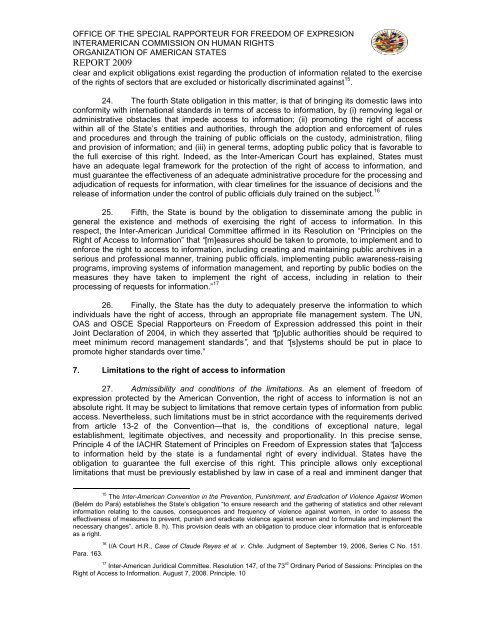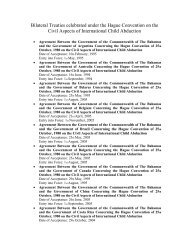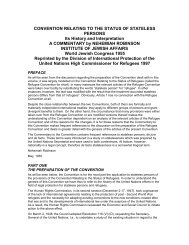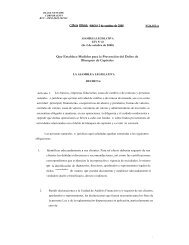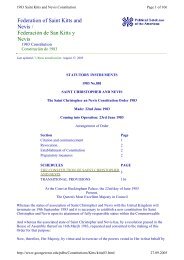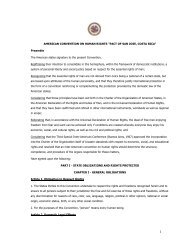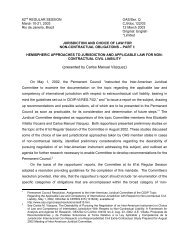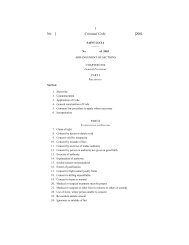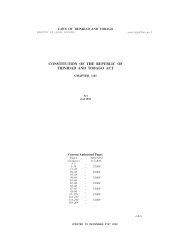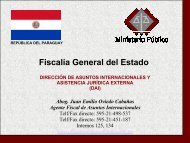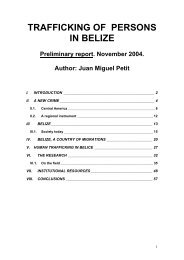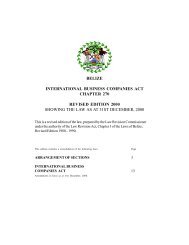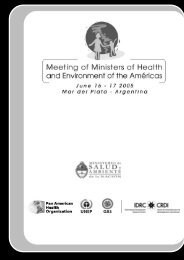The right of access to information Special Rapporteurship for ... - OAS
The right of access to information Special Rapporteurship for ... - OAS
The right of access to information Special Rapporteurship for ... - OAS
Create successful ePaper yourself
Turn your PDF publications into a flip-book with our unique Google optimized e-Paper software.
OFFICE OF THE SPECIAL RAPPORTEUR FOR FREEDOM OF EXPRESION<br />
INTERAMERICAN COMMISSION ON HUMAN RIGHTS<br />
ORGANIZATION OF AMERICAN STATES<br />
REPORT 2009<br />
clear and explicit obligations exist regarding the production <strong>of</strong> <strong>in<strong>for</strong>mation</strong> related <strong>to</strong> the exercise<br />
<strong>of</strong> the <strong>right</strong>s <strong>of</strong> sec<strong>to</strong>rs that are excluded or his<strong>to</strong>rically discriminated against 15 .<br />
24. <strong>The</strong> fourth State obligation in this matter, is that <strong>of</strong> bringing its domestic laws in<strong>to</strong><br />
con<strong>for</strong>mity with international standards in terms <strong>of</strong> <strong>access</strong> <strong>to</strong> <strong>in<strong>for</strong>mation</strong>, by (i) removing legal or<br />
administrative obstacles that impede <strong>access</strong> <strong>to</strong> <strong>in<strong>for</strong>mation</strong>; (ii) promoting the <strong>right</strong> <strong>of</strong> <strong>access</strong><br />
within all <strong>of</strong> the State’s entities and authorities, through the adoption and en<strong>for</strong>cement <strong>of</strong> rules<br />
and procedures and through the training <strong>of</strong> public <strong>of</strong>ficials on the cus<strong>to</strong>dy, administration, filing<br />
and provision <strong>of</strong> <strong>in<strong>for</strong>mation</strong>; and (iii) in general terms, adopting public policy that is favorable <strong>to</strong><br />
the full exercise <strong>of</strong> this <strong>right</strong>. Indeed, as the Inter-American Court has explained, States must<br />
have an adequate legal framework <strong>for</strong> the protection <strong>of</strong> the <strong>right</strong> <strong>of</strong> <strong>access</strong> <strong>to</strong> <strong>in<strong>for</strong>mation</strong>, and<br />
must guarantee the effectiveness <strong>of</strong> an adequate administrative procedure <strong>for</strong> the processing and<br />
adjudication <strong>of</strong> requests <strong>for</strong> <strong>in<strong>for</strong>mation</strong>, with clear timelines <strong>for</strong> the issuance <strong>of</strong> decisions and the<br />
release <strong>of</strong> <strong>in<strong>for</strong>mation</strong> under the control <strong>of</strong> public <strong>of</strong>ficials duly trained on the subject. 16<br />
25. Fifth, the State is bound by the obligation <strong>to</strong> disseminate among the public in<br />
general the existence and methods <strong>of</strong> exercising the <strong>right</strong> <strong>of</strong> <strong>access</strong> <strong>to</strong> <strong>in<strong>for</strong>mation</strong>. In this<br />
respect, the Inter-American Juridical Committee affirmed in its Resolution on “Principles on the<br />
Right <strong>of</strong> Access <strong>to</strong> In<strong>for</strong>mation” that “[m]easures should be taken <strong>to</strong> promote, <strong>to</strong> implement and <strong>to</strong><br />
en<strong>for</strong>ce the <strong>right</strong> <strong>to</strong> <strong>access</strong> <strong>to</strong> <strong>in<strong>for</strong>mation</strong>, including creating and maintaining public archives in a<br />
serious and pr<strong>of</strong>essional manner, training public <strong>of</strong>ficials, implementing public awareness-raising<br />
programs, improving systems <strong>of</strong> <strong>in<strong>for</strong>mation</strong> management, and reporting by public bodies on the<br />
measures they have taken <strong>to</strong> implement the <strong>right</strong> <strong>of</strong> <strong>access</strong>, including in relation <strong>to</strong> their<br />
processing <strong>of</strong> requests <strong>for</strong> <strong>in<strong>for</strong>mation</strong>.” 17<br />
26. Finally, the State has the duty <strong>to</strong> adequately preserve the <strong>in<strong>for</strong>mation</strong> <strong>to</strong> which<br />
individuals have the <strong>right</strong> <strong>of</strong> <strong>access</strong>, through an appropriate file management system. <strong>The</strong> UN,<br />
<strong>OAS</strong> and OSCE <strong>Special</strong> Rapporteurs on Freedom <strong>of</strong> Expression addressed this point in their<br />
Joint Declaration <strong>of</strong> 2004, in which they asserted that “[p]ublic authorities should be required <strong>to</strong><br />
meet minimum record management standards”, and that “[s]ystems should be put in place <strong>to</strong><br />
promote higher standards over time.”<br />
7. Limitations <strong>to</strong> the <strong>right</strong> <strong>of</strong> <strong>access</strong> <strong>to</strong> <strong>in<strong>for</strong>mation</strong><br />
27. Admissibility and conditions <strong>of</strong> the limitations. As an element <strong>of</strong> freedom <strong>of</strong><br />
expression protected by the American Convention, the <strong>right</strong> <strong>of</strong> <strong>access</strong> <strong>to</strong> <strong>in<strong>for</strong>mation</strong> is not an<br />
absolute <strong>right</strong>. It may be subject <strong>to</strong> limitations that remove certain types <strong>of</strong> <strong>in<strong>for</strong>mation</strong> from public<br />
<strong>access</strong>. Nevertheless, such limitations must be in strict accordance with the requirements derived<br />
from article 13-2 <strong>of</strong> the Convention—that is, the conditions <strong>of</strong> exceptional nature, legal<br />
establishment, legitimate objectives, and necessity and proportionality. In this precise sense,<br />
Principle 4 <strong>of</strong> the IACHR Statement <strong>of</strong> Principles on Freedom <strong>of</strong> Expression states that “[a]ccess<br />
<strong>to</strong> <strong>in<strong>for</strong>mation</strong> held by the state is a fundamental <strong>right</strong> <strong>of</strong> every individual. States have the<br />
obligation <strong>to</strong> guarantee the full exercise <strong>of</strong> this <strong>right</strong>. This principle allows only exceptional<br />
limitations that must be previously established by law in case <strong>of</strong> a real and imminent danger that<br />
15 <strong>The</strong> Inter-American Convention in the Prevention, Punishment, and Eradication <strong>of</strong> Violence Against Women<br />
(Belém do Pará) establishes the State’s obligation “<strong>to</strong> ensure research and the gathering <strong>of</strong> statistics and other relevant<br />
<strong>in<strong>for</strong>mation</strong> relating <strong>to</strong> the causes, consequences and frequency <strong>of</strong> violence against women, in order <strong>to</strong> assess the<br />
effectiveness <strong>of</strong> measures <strong>to</strong> prevent, punish and eradicate violence against women and <strong>to</strong> <strong>for</strong>mulate and implement the<br />
necessary changes”, article 8. h). This provision deals with an obligation <strong>to</strong> produce clear <strong>in<strong>for</strong>mation</strong> that is en<strong>for</strong>ceable<br />
as a <strong>right</strong>.<br />
Para. 163.<br />
16 I/A Court H.R., Case <strong>of</strong> Claude Reyes et al. v. Chile. Judgment <strong>of</strong> September 19, 2006, Series C No. 151.<br />
17 Inter-American Juridical Committee. Resolution 147, <strong>of</strong> the 73 rd Ordinary Period <strong>of</strong> Sessions: Principles on the<br />
Right <strong>of</strong> Access <strong>to</strong> In<strong>for</strong>mation. August 7, 2008. Principle. 10


